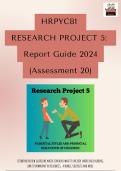HRPYC81
RESEARCH PROJECT 5:
Report Guide 2024
(Assessment 20)
LITERATURE REVIEW GUIDELINE WHICH CONTAINS WHAT TO INCLUDE UNDER EACH HEADING,
LINK TO DOWNLOAD THE RESOURCES, A RUBRIC/CHECKLIST AND MORE.
, Property of Perfectionist Notes
Illegal distribution/selling/use will be prosecuted
Contents
1. Instructions ..................................................................................................................................... 2
2. The broad topic .............................................................................................................................. 5
3. The Rubric ....................................................................................................................................... 6
4. STRUCTURE OF THE REPORT .......................................................................................................... 7
5. APA 7TH EDITION REFERENCING GUIDE......................................................................................... 61
6. Past Project that got 95% ............................................................................................................. 67
, Property of Perfectionist Notes
Illegal distribution/selling/use will be prosecuted
1. Instructions
Research Area: Developmental Psychology
Project Title: The effect of parental styles on perceived children’s pro-and anti-social
behaviour: Does the neighbourhood matter?
Limited to 300 students
Project Description
Have you ever seen a child who shows a variety of prosocial behaviours, such as helping their
friends to attain certain goals, responding to others’ emotional needs, and sharing their resources?
Have you ever wondered why some children show more prosocial behaviour than others and why
some children act anti socially?
• Prosocial behaviour is based on an inborn, natural tendency in human beings to help other
members of their own species. This inborn tendency facilitates the survival of the species.
• According to Eisenberg et al. (2006), prosocial behaviour entails a voluntary action that is
intended to benefit another individual. The impulse to be prosocial can often be seen as
early as during the first two years of life.
• Some researchers propose that prosocial behaviour represents an evolutionary adaptation:
people who help others are more likely to be helped themselves and thus are more likely to
survive and have offspring (see Penner et al., 2005).
• However, when we research prosocial behaviour, the development of prosocial behaviour
shows a mixed pattern.
• Some prosocial behaviours, such as taking turns and helpfulness, seem to increase with age,
while others, such as comforting someone, seem more common in younger children than
among older children.
• According to Eisenberg et al. (2015), prosocial behaviour typically increases with
development: adolescents are more likely to help than children, who are more likely to help
than pre-schoolers. These changes in prosocial behaviour reflect children’s growing
understanding of others’ needs and appropriate altruistic responses.
• There is increasing interest in understanding how to foster young children’s prosocial
behaviour (Sinrad & Gal, 2018).
, Property of Perfectionist Notes
Illegal distribution/selling/use will be prosecuted
For instance, Paulus (2018) investigated the multidimensional nature of early prosocial
behaviour and argued that different prosocial behaviours have unique antecedents and
correlates, indicating that prosocial behaviours form a heterogeneous category – at least
early in development.
• One of the antecedents is parenting styles, as they shape children’s prosocial behaviour
(Smetana, 2017; Wong et al., 2020).
For instance, a recent study conducted within the South African context showed that
authoritarian and authoritative parenting styles influence the prosocial behaviour of pre-
adolescents in a low socio-economic community in South Africa.
• Parenting does not occur in a social vacuum. Therefore, it is unsurprising that researchers
are interested in understanding how neighbourhood characteristics influence parenting.
• Extensive research established the relationship between perceived neighbourhood
characteristics and delinquent behaviour and neighbourhood characteristics and parenting
styles.
• The missing link is to understand the relationships between perceived neighbourhood
characteristics, parenting styles and perceived children’s pro- and anti-social behaviour.
Therefore, this missing link will be addressed in this research project.
NB! NB! NB!
Students in this research project will learn about the concepts of perceived neighbourhood
characteristics, parenting styles, and children’s prosocial behaviour.
These relationships will be studied using a cross-sectional online survey, which will be
hosted on the research platform Qualtrics.
THIS INFORMATION IS BASED ON HRPYC81 TUT 102, 2024
AND TUT 103, 2024




